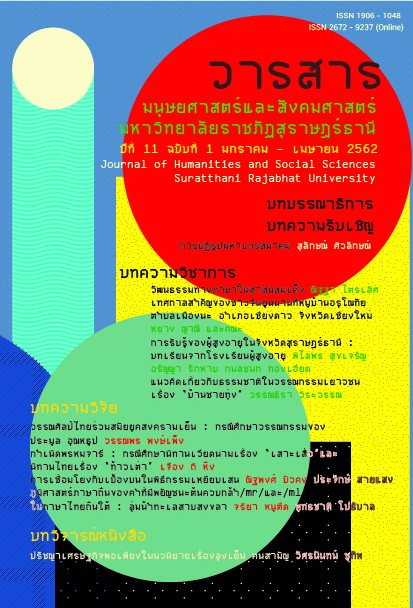The perception pathway of elderly people: Lesson Learned from Elderly School
Main Article Content
Abstract
With improved health care and increased affluence people are living longer in Thailand than they did in the past. Increased life expectancy has, in turn, led to changes in the demographics of Thai society with a larger percentage of the population living well into their senior years. Services and support for seniors, however, have not kept pace with the changing demographics, and Thailand now finds itself in a situation where the specific health and emotional needs of an ageing population require strategic planning and preparation. With this in mind, the Faculty of Nursing and Health Sciences at Suratthani Rajabhat University has been instrumental in initiating courses for seniors in the community, and has used the occasion to canvass participating students on a range of issues germane to their particular needs. Panel discussions were held with eight students after they had completed the program last year and the data obtained was subjected to content analysis in order to discover recurring patterns of shared concern. Students were canvassed on their thoughts and concerns prior to beginning the 16 week program and then once established, participants considered how those concerns were addressed in terms of the program's delivery. At the outset, students were particularly concerned about the deteriorating state of their physical health but noted that the program's health component provided them with the knowledge needed to manage and improve their health and vitality. Emotionally, participants expressed feelings of loneliness and anomie before commencing the program but found that the program itself provided them with a supportive social network that now extends beyond the confines of the university. Likewise, participants said they spent a lot of time dwelling on their ageing and impending mortality before the program began but found the program beneficial for helping them develop a more positive attitude towards ageing. Taken together, such quality of life attitudinal changes show the value of participatory learning programs that support and value the elderly.
Article Details

This work is licensed under a Creative Commons Attribution-NonCommercial-NoDerivatives 4.0 International License.
All published manuscripts have been verified by peer-peer professors in the fields of humanities and social sciences. Reprinting of the article must be authorized by the editorial staff.
References
Bashkirevaa, A., Kachanb, Y., and Kulapinad, M. (2015). Psychophysiological Markers of Accelerated Aging in Working - Age People Exposed to Occupational Hazards Communication I. Age - Related Changes in Short - Term Memory Advances in Gerontology. Advances in Gerontology. 5(4), 277 – 282.
Chan, C., and Liang, J. (2013). Active Aging: Policy Framework and Applications to Promote Older Adult Participation in Hong Kong. Ageing Int. 38, 28 – 42.
Chen, S. (2016). Determining the service demands of an aging population by integrating QFD and FMEA method. Qual Quant. 50, 283 – 298.
Chukieat Mutthakarn. (2016). The society of elderly people with prepare to dealing. Journal of southern technology. 9(1), 131 - 138. (in Thai)
Cinotti, E; et al. (2016). Skin tumours and skin aging in 209 French elderly people: the PROOF study. Eur J Dermatol. 26(5), 470 - 476.
Jutharat Sangthong. (2017). Aging Society (Complete Aged): The elderly condition of good quality. Rusamilae Journal. 38(1), 6 - 28. (in Thai)
Kanokorn Poonpiam and Siriphan Sasat. (2017). Factors Related To Health Related Quality Of Life In Older Persons With Age - Related Macular Degeneration. Journal of The Royal Thai Army Nurses. 1 8 , 3 8 2 - 3 9 2 . (in Thai)
Karunpich Kotpratum and Kanittha Nuntaboot. (2016). Community Continuing Care for Older People. Suranaree J. Sci. Technol. 2 5 ( 3 ) , 2 7 5 - 2 8 6 . (in Thai)
Kitsanaporn Tipkanjanaraykha; et al. (2017). Health information seeking behaviors of elderly through online media Accordingto perceivedhealth status. Journal of Health science research. 1 1 , 1 2 - 2 2 . ( i n T h a i )
Matichon. (2010). The elderly peoples are main part of Thailand’ society and culture. [Online]. Retrieved form http://www.saisawankhayanying.com/s-featured/on-the-elderly/ [2018, November 3]. (in Thai)
Popejoy, L; et al. (2015). Comparing Aging in Place to Home Health Care: Impact of Nurse Care Coordination On Utilization and Costs. Nursing Economics. 33(6), 306 - 313.
Sivalap Sukpaiboonwat. (2017). The role of population aging on economic growth in Thailand. Journal of Humanities and Social Sciences. 9(17), 176 - 191. (in Thai)
Sommai Gumphun, Sopin Sangon and Patcharin Nintachan. (2016). Factors influencing loneliness in older adults. journal of psychiatric nursing and mental health. 30(2), 50 - 68. (in Thai)
Sompraveen Munpraseart. (2010). The effect of elderly society to Thailand’ economy system. [Online]. Retrieved form http://prp.trf.or.th/trf-policy-brief [2018, November 3]. (in Thai)
Suangsuda Charoenwong; et al. (2018). Long - term Care Management Guidelines for Dependent Elders in a Muslim Community, Southern Thailand. Princess of Naradhiwas University Journal. 1 0 ( 3 ) , 1 - 1 1 . (in Thai)
Suda Wongsawad; et al. (2018). Developing Activity Models in order to Promote Health in the Risk Group of Elders, for the Community Health. 10(1), 192-209. (In Thai)


